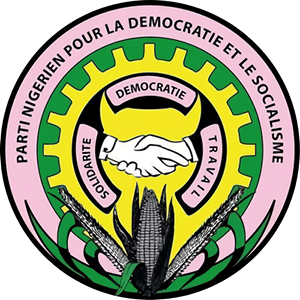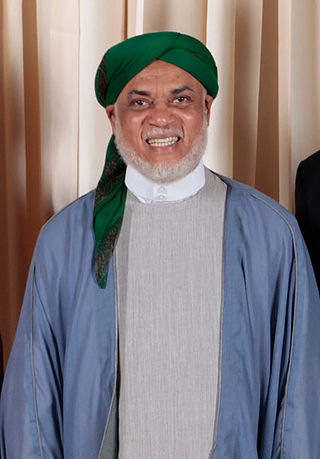 |
|---|
|
The Islands' Fraternity and Unity Party (Comorian: Chama cha Upvamodja na Mugangna wa Massiwa, CHUMA) is a political party in the Comoros.
 |
|---|
|
The Islands' Fraternity and Unity Party (Comorian: Chama cha Upvamodja na Mugangna wa Massiwa, CHUMA) is a political party in the Comoros.
The party was formed in Paris in the 1980s by the National Committee for Public Salvation led by Saïd Ali Kemal, the Comorian National United Front and the Union of Comorians. [1]
CHUMA nominated Kemal as its candidate for the 1990 presidential elections. Kemal finished third of out eight candidates with 13.7% of the vote. [2] In the 1992 parliamentary elections the party received 6.2% of the vote, winning three of the 42 seats. However, in the early parliamentary elections the following year CHUMA was reduced to a single seat.
Kemal briefly served as acting president in 1995, and was the party's candidate again for the 1996 presidential elections, finishing fourth out of 15 candidates with 8.7% of the vote. The party boycotted the parliamentary elections later in the year.
The party campaigned for a "no" vote in the 2001 constitutional referendum, [1] but the new constitution was approved by 77% of voters. Kemal ran for the presidency again in the 2002 elections. Although he finished in third place in the primary election on Grande Comore and was entitled to contest the national elections, he opted to boycott the vote. [2] Prior to the 2004 parliamentary elections the party joined the Camp of the Autonomous Islands alliance, which won 27 of the 33 seats. [1]
The party did not put forward a candidate for the 2006 presidential elections, but instead backed Ibrahim Halidi of the Movement for the Comoros, with Kemal being one of his running mates. [1] Halidi finished second in the elections. In the 2010 presidential elections the party supported the victorious Ikililou Dhoinine. [1] CHUMA received only 277 votes in the 2015 parliamentary elections, failing to win a seat.

The Union of the Comoros consists of the three islands Njazidja, Mwali (Moheli) and Nzwani (Anjouan) while the island of Mayotte remains under French administration. The Politics of the Union of the Comoros take place in a framework of a unitary presidential republic, whereby the President of the Comoros is both head of state and head of government, and of a multi-party system. Executive power is exercised by the government. Legislative power is vested in both the government and parliament. The precolonial legacies of the sultanates linger while the political situation in Comoros has been extremely fluid since the country's independence in 1975, subject to the volatility of coups and political insurrection.

The United National Independence Party (UNIP) is a political party in Zambia. It governed the country from 1964 to 1991 under the socialist presidency of Kenneth Kaunda, and was the sole legal party in the country between 1973 and 1990. On 4 April 2021, Bishop Trevor Mwamba was elected President of UNIP.

Elections in the Comoros take place within the framework of a multi-party democracy and a presidential system. The President and the majority of the seats in the Assembly of the Union are directly elected.

The Nigerien Alliance for Democracy and Progress is a political party in Niger. Moumouni Adamou Djermakoye led the party from its foundation in 1992 until his death in 2009.

The Nigerien Party for Democracy and Socialism is a political party in Niger. It is a broadly left-leaning party, part of the Socialist International, and in 2011, it has been in power following the election of the former long-time leader, Mahamadou Issoufou. Mohamed Bazoum is the former President of the party and the former Secretary-General is Foumakoye Gado.

Presidential elections were held in the Comoros on 16 April and 14 May 2006. As it was the turn of the island of Anjouan to hold the union presidency, a primary election was held in Anjouan on 16 April, prior to a national election on 14 May. The result was a victory for Ahmed Abdallah Mohamed Sambi, who received 58% of the vote in the national election.

Sayyid Ahmed Abdallah Mohamed Sambi is a Comorian Islamic leader and politician, and former President of Comoros. He is popularly known as 'Ayatollah'. After easily winning the 14 May 2006 presidential election with 58.02% of the national vote, Sambi was inaugurated as President of the Union of the Comoros on 26 May 2006. It was the first peaceful transfer of power in the history of the Comoros.
Ibrahim Halidi was a long-time politician in Comoros. Halidi was the Prime Minister of Comoros from January to May 1993. Halidi also ran for president in May 2006 with the backing of the outgoing president, Azali Assoumani. In the first round of the election, Halidi finished in third place with 10.37% and qualified for the presidential second round, which was held on 14 May. Halidi lost the presidential election to Ahmed Abdallah Sambi. Ibrahim Halidi was supported by the Islands' Fraternity and Unity Party (CHUMA), Convention for the Renewal of the Comoros (CRC), Movement for the Comoros (MPC) and the Djawabu Party (DJAWABU).
The Comorian Union for Progress is a political party in the Comoros.

Parliamentary elections were held in the Comoros on 22 November 1992, with a second round on 29 November 1992. Due to electoral irregularities in the initial elections, there were also by-elections in six of the 42 constituencies on 13 and 20 December.

The Rally for Democracy and Progress is a political party in Mali.

The Juwa Party is a political party in the Comoros. The party was established by former president Ahmed Abdallah Mohamed Sambi in 2013 and became the main opposition party in 2015. After boycotting the 2020 elections, it currently has no representation in parliament.

The Movement for Democracy and Progress, also known as the People's Democratic Movement was a political party in the Comoros.

The Democratic Front of the Comoros was a political party in the Comoros.

The National Rally for Development was a political party in the Comoros.

The National Union for Democracy in the Comoros was a political party in the Comoros.

The Comorian Party for Democracy and Progress was a political party in the Comoros.

The Comorian Popular Front was a political party in the Comoros.

Parliamentary elections were held in the Comoros on 19 January 2020; in constituencies where no candidate received a majority, a second round was held alongside local elections on 23 February. The elections were boycotted by the main opposition parties, including the two largest parties in the outgoing Assembly, the Union for the Development of the Comoros and Juwa Party, in protest at constitutional reform and political repression, The result was a landslide victory for President Azali Assoumani's Convention for the Renewal of the Comoros, which won 20 of the 24 elected seats.
Said Ali Kemal was a Comorian politician. He was the son of Prince Saïd Ibrahim Ben Ali and the grandson of Sultan Said Ali bin Said Omar of Grande Comore.